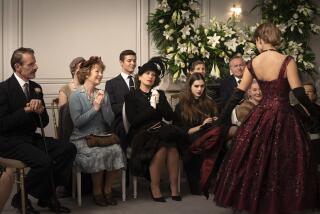She’s a Lady (Whoa, Whoa, Whoa)
- Share via
Betrothed at 14 to the future king of France, the Viennese-born Marie Antoinette looks forward with giddy excitement to her royal future among the exotic French, who are said to “piss into chamber pots made of lapis and dine on common garden slugs.” As Kathryn Davis’ elegant little novel “Versailles” opens, young Antonia is traveling toward her future. “My soul is going on a trip. I want to talk about her,” she confides. Raised to believe that she is destined to be the queen of France, she is curious to meet the 15-year-old Dauphin, “who also has a soul, though more visible and worldly, its body already formed (so I’ve been told) from layers of flesh and fat.
“I was eager to please, though that meant something other than acquiesce to another’s desire,” she reflects. “Pleasing meant my own desire: the place where my body and soul met, like the musician’s bow bearing down on the string, teasing a sound out: ah ah ah ah ah!”
And so begins this rich and strange meditation on the silly little girl whose destiny was to be misunderstood by her people and by history. The story is told in passages of first-person narrative, dramatic dialogues, allegorical tales and descriptive, panoramic tours of the gardens, halls and rooms at Versailles. Rather than calling her novel after its subject, Davis chose “Versailles,” and that seems right, as this fractured yet ultimately persuasive and sympathetic portrait of Antoinette seems to glide from room to room as it hovers over the life of the most famous occupant of those halls and chambers.
Louis XVI ascended to the throne when he turned 20. He was by all accounts a bizarre character, obsessed with locks and mechanical devices and plagued by a problem with his foreskin called phimosis, which necessitated circumcision at age 22 so he could produce heirs. Davis is at her provocative best as she imagines his queen’s affectionate impatience:
“Antoinette and Louis, as inept in bed as on the throne, though goodness knows we tried. That mattress, those hands. The sound of his breathing, the weight of his torso .... But did I feel stirred? Yes, I admit, I did, a little. It was like the way I’d sometimes feel while I was sitting for my portrait, an almost unendurable sense of my self, of the surfaces of Antoinette, her eyes trying not to blink, her lips growing more and more pursed and dry, her tongue dying to lick them. And then just when I’d think I couldn’t bear to sit there like that one minute longer, I’d suddenly find myself on the outside looking in, a traveler in a carriage passing an apparently deserted house at nightfall. The windows dark, no hint of movement, yet somewhere deep inside, in the deepest darkest corner of the cellar, there would be a little sleeping animal who would prick up its ears.”
Davis, the author of several distinctive novels, among them “The Girl Who Trod on a Loaf” and “The Walking Tour,” has created for Antoinette an extraordinary sensibility which carries the story. Worldly yet naive, she has an uncanny ability to bear witness to her own experience, from the early pleasures of court life to the final elegiac inventory of Versailles:
“Two hundred twenty steps. A million miles. From the Salon of Peace to the Salon of War, from the root to the crown, from the rock to the spring. From Versailles to Paris, from heaven to earth.
“Seventeen arcades, each with eighteen mirrors. Three hundred six mirrors, and in every one of them no Antoinette.”
More to Read
Sign up for our Book Club newsletter
Get the latest news, events and more from the Los Angeles Times Book Club, and help us get L.A. reading and talking.
You may occasionally receive promotional content from the Los Angeles Times.










